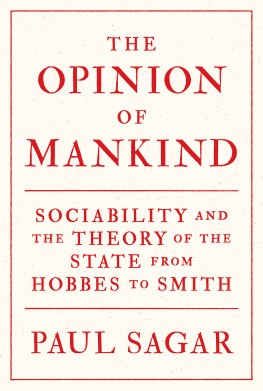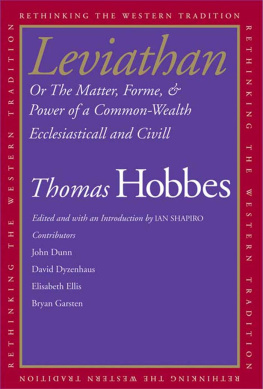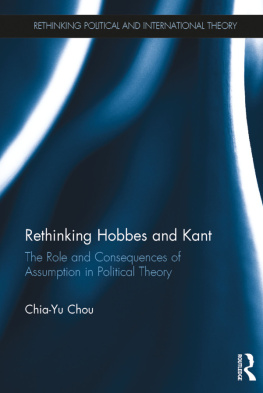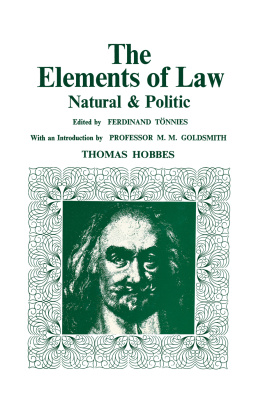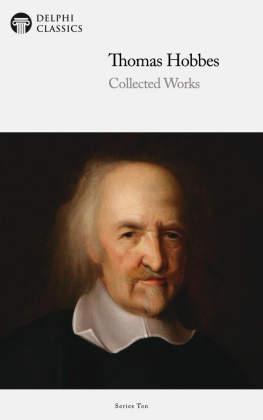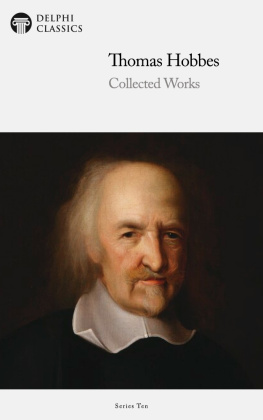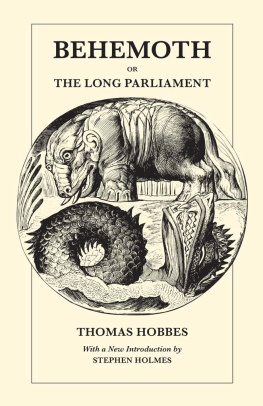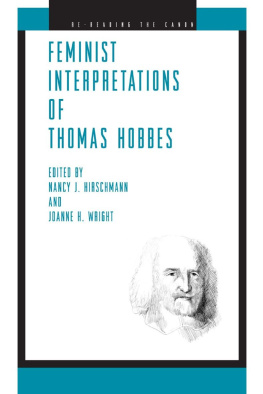
THE OPINION OF MANKIND
The Opinion of Mankind
SOCIABILITY AND THE THEORY OF THE STATE FROM HOBBES TO SMITH

Paul Sagar
PRINCETON UNIVERSITY PRESS
PRINCETON & OXFORD
Copyright 2018 by Princeton University Press
Published by Princeton University Press,
41 William Street, Princeton, New Jersey 08540
In the United Kingdom: Princeton University Press,
6 Oxford Street, Woodstock, Oxfordshire OX20 1TR
press.princeton.edu
All Rights Reserved
ISBN 978-0-691-17888-2
Library of Congress Control Number: 2017945419
British Library Cataloging-in-Publication Data is available
This book has been composed in Miller
Printed on acid-free paper.
Printed in the United States of America
10 9 8 7 6 5 4 3 2 1
To Bob Hargrave, who taught me the art of philosophy, and Istvn Hont, who showed me the importance of history.
As is the osprey to the fish, who takes it
By sovereignty of nature. First he was
A noble servant to them; but he could not
Carry his honours even: whether twas pride,
Which out of daily fortune ever taints
The happy man; whether defect of judgment,
To fail in the disposing of those chances
Which he was lord of; or whether nature,
Not to be other than one thing, not moving
From the casque to the cushion, but commanding peace
Even with the same austerity and garb
As he controlld the war; but one of these
As he hath spices of them all, not all,
For I dare so far free himmade him feard,
So hated, and so banishd: but he has a merit,
To choke it in the utterance. So our virtues
Lie in the interpretation of the time:
And power, unto itself most commendable,
Hath not a tomb so evident as a chair
To extol what it hath done.
One fire drives out one fire; one nail, one nail;
Rights by rights falter, strengths by strengths do fail.
(WILLIAM SHAKESPEARE, THE TRAGEDY OF CORIOLANUS)
CONTENTS
ACKNOWLEDGMENTS
I HAVE INCURRED enormous intellectual and personal debts in the course of writing this work. Particularly important were the support and direction of my teachers during graduate study, when the foundations of this book were laid. Quentin Skinner at Queen Mary, and then Istvn Hont at Cambridge, helped me to see (if not always fulfill) the tasks required for treating the history of political thought with the seriousness that it demands. My debts to Istvn in particular are especially large, and it is a source of continual sadness that his early death meant that he never had the chance to tell me why the entirety of what follows is wrong. I am also deeply indebted to John Robertson for taking over the (not always enviable) task of supervising my PhD thesis in its later stages, and for offering me guidance and advice then and since.
A number of individuals were especially supportive over the course of writing this work, and deserve particular mention. Richard Bourke has been a permanent source of scholarly and personal support since my days at Queen Mary, and I would not be where I am without him. I am deeply grateful. Hallvard Lillehammer has long provided a refreshing change of perspective, a sense of proportion, and a sharp critical eye. Edward Hall has been one of my longest-serving readers, and a continual source of encouragement. Robert Jubb has been one of my most critical readers, and his willingness to hold me to account has been of immense value (numerous reflexive protestations notwithstanding). Robin Douglass has provided an unfailingly sharp eye, and his generosity (and speed) in returning his thoughts has helped me immeasurably. Nakul Krishna has been a long-standing source of intellectual stimulation and inspiration, as well as bastion of encouragement in the quest to advance a humanistic discipline. Bernardo Zacka has often been the reason Ive kept going, not just through his personal encouragement, but via the example that his scholarship sets. Clif Mark and Waseem Yaqoob have helped to remind me that there is a life outside of the academy, usually when I most needed reminding. Tom Pye has been an excellent discussant of eighteenth-century political thought, and spotted important changes required at the final stages of this manuscripts preparation. Ben Tate has been an exemplary editor for this project, and his unfailing support and belief are greatly appreciated.
During my time at Cambridge I have been privileged to work alongside an astonishingly talented group of junior colleagues. Their presence created an intellectual environment of great fertility. I am accordingly grateful to Teresa Bejan, Jos Betts, Kenzie Bok, Greg Conti, Hugo Drochan, Katrina Forrester, Tom Hopkins, Sam James, Emily Jones, Dmitri Levitin, Kristen Loveland, Dom OMahony, Clara Maier, Ben Slingo, Sophie Smith, James Stafford, Hester van Hensbergen, Stephen Wertheim, and Sam Zeitlin for being where they were, at the various times that they were there.
I owe debts to many other colleagues at Cambridge. Duncan Kelly served as my doctoral examiner, and was a permanent source of advice and critical insight during the long writing of what became this book. In the Department of Politics, I am especially grateful to Duncan Bell, Chris Brooke, David Runciman, and Helen Thompson, each of whom has been continually generous in offering me support, direction, and encouragement. At Kings College, Anna Alexandrova, Jude Browne, John Dunn, James Laidlaw, Perveez Mody, Mike Sonenscher, and Sharath Srinivasan have been the best of colleagues to work with and teach alongside. I am also grateful to Mike Proctor for helping make Kings such a congenial place to live and work. In the Department of Philosophy, Clare Chambers and John Filling have been unfailing sources of intellectual engagement and encouragement. In History, I owe thanks to Annabel Brett, Joel Isaac, Chris Meckstroth, Magnus Ryan, Sylvana Tomaselli, and Damien Valdez.
Beyond Cambridge, debts are due to many others, not least my parents Keith and Francine, for their continuous love and support. In addition, thanks must go to Tom Adams, Ben Alston, Bob Arnold, James Arnold, Hollie Booth, Josh Booth, Anna Comboni, Louis Caron, Raph Cormack, Sam Davis, Abigail DeHart, Anne Marie Droste, Roisin Ellison, John Fahy, Ben Fairhurst, Mark Fisher, Ste Forshaw, Ste Gallivan, Nick Gooding, Angus Gowland, Ben Gray, Sam Greenbury, James Harris, Kinch Hoekstra, Jonathan Howard, Shaun Hurrell, Jeremy Jennings, Will Jones, Bla Kapossy, Mads Langballe Jensen, Graham Lean, Jay Levy, Anja Lindberg, Beth Lister, Nathan Masih-Hanneghan, Sarah Maule, Iain McDaniel, Roia McHugh, Ben Murphy, Isaac Nakhimovsky, Stuart Nistead, Ali North, Simon ODonoghue, Johan Olsthoorn, Rob Parr, Phil Parvin, Ste Paweleck, Cady Pearce, Andrew Price, Ryan Rafferty, Paul Rimmer, Enzo Rossi, Matt Sleat, Dana Smith, Hattie Soper, Tom Stein, James Swire, Caighli Taylor, Mark Thakkar, Chris Thomson, Jonas Tinius, Chris Townsend, Richard Tuck, Georgios Varouxakis, Rosie Wagner, Ruth Watkinson, Calum Watson, Sarah Williams, James Wilson, Peter Wirnsberger, and Sophie Zadeh. Especial gratitude is reserved for Shamu and Hera.
Some parts of this work have appeared previously. Parts of appeared as The State without Sovereignty: Authority and Obligation in Humes Political Philosophy (History of Political Thought 37, no. 2 [2016], 271305). Both are reproduced here by permission of the editors and publishers.
THE OPINION OF MANKIND
Next page
